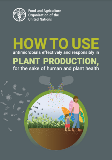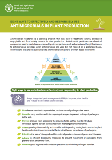Using antimicrobials in plant protection with human and planetary health in mind

©FAO/LucieChocholata
FAO has released two new publications about using antimicrobials responsibly in plant production. While they can prevent and treat infections in plants as well as in people and animals, good stewardship is important, the publications explain. Prudent, rational and targeted use of antimicrobials (antibiotics, antivirals, antifungals and antiparasitics) maximizes their therapeutic efficacy, reduces the risk of developing resistance, decreases environmental contamination, improves food safety, prevents plant losses and ultimately increases profits for growers.
Fruits, vegetables and other foods of plant origin can become carriers of antimicrobial-resistant bacteria and antibiotic resistance genes. These foods, in particular if consumed raw, may be vehicles for the transmission of antimicrobial resistant bacteria to people. This is why concerted efforts should be made to mitigate antimicrobial contamination, including in soils and water.
“How to use antimicrobials effectively and responsibly in plant production, for the sake of human and plant health” outlines the four principles on which good stewardship is based:
- Reducing the need for antimicrobials by adopting integrated pest management to control plant pests and diseases;
- Managing plant diseases with minimal use of antimicrobials;
- Following antimicrobial guidance and label instructions precisely; and
- Disposing of unused antimicrobials and their containers safely.
This 16-page booklet includes suggestions as to how farmers can apply these principles to better ensure plant, human and environmental health.
The booklet is supplemented by a two-page fact sheet, “Eight ways to effectively and responsibly use antimicrobials in plant production,” that provides concise, actionable advice for crop producers.
“Antimicrobial resistance, or AMR, can develop whenever antimicrobials are used,” Jeffrey LeJeune, FAO Food Safety Officer, said in explaining that AMR develops more quickly when antimicrobials are not used properly, such as to treat nutritional deficiencies, on infections that are not susceptible to the antimicrobial, at an incorrect dose or on a prolonged basis.
“Antimicrobial resistance affects human, animal and plant health and therefore needs to be addressed through a One Health approach, which involves collaboration across disciplines and sectors to optimize the health of people, animals and ecosystems” said Kim-Anh Tempelman, FAO Project Officer.
World AMR Awareness Week started on 18 November and ends on 24 November this year. The theme is ‘Preventing antimicrobial resistance together’ to promote collaboration across sectors to preserve the efficacy of these critical medicines.


